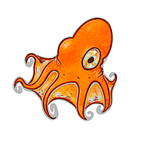Understanding our Sentient Animal Friends
We’ve all got relatives and friends that we love but find some of their personality traits beyond annoying to downright insulting. I’m pretty sure they find some things in us completely questionable. We are all individuals you see. We’ve all come to be us through a soupy mix of DNA and life experiences. Results will vary. Yet, we still love our friends and relatives and spouses in spite of those points of contention. We learn to accept them for “who they are”.
I am considered a unicorn in my family. Annoyingly private, hard to catch. Harder to spend time with than they prefer. Some find it downright wrong; others just accept my ways as me, and when we do get together, we have a grand time. I am private, to a fault. You could call me selfish. My daughter would like to see me “fix” this issue. My sisters shrug it off and laugh knowing when the moon and planets are in alignment, they will find me in the mist of Jupiter.
We accept the idiosyncrasies of each other as normal and expected. Yet, for some reason, we cannot accept the idea that companion animals and their wild cousins, too, will have a set of personality traits. Traits that taken in the whole of their personality makes them who they really are as a singular personality.
We can, as humans, accept the idea of changes in tastes, beliefs, and preferences as we age and experience new things in our lifespan. I liked certain foods before, I do not now. Age and time will do that to a person. Age and time will do that to a companion animal as well. It seems though, we see these changes in our companions as a fault. Something to be fixed rather than acknowledged as growth and expansion of their personality. That’s not fair to them, or us.
Either you believe and modify the actions, words, and approaches you bring to companions, or you do not. If you do not, if you cannot, then you agree by your own actions that they are just a pet to be controlled, commodified, and put on display for one reason or another.
Science continues to add wild and companion animal species to the thinking list. Homo Sapiens are not the only thinker. We are not the only kind that seeks love, safety, food, and life.
So, as such, when our companion is “misbehaving”, “being mean”, “not obeying”, “defensive”, “not bonding”, “not cooperating”, “acting hormonal”, “screaming”, “howling”, “barking”, “hissing”, “insert standard complaint here”; my first reaction is simple. What is going on with the human in the room?
If the human in the room is not conducting themselves as participants in a companion relationship, then the companion doesn’t need the fixing. The human’s understanding requires the tune-up.
